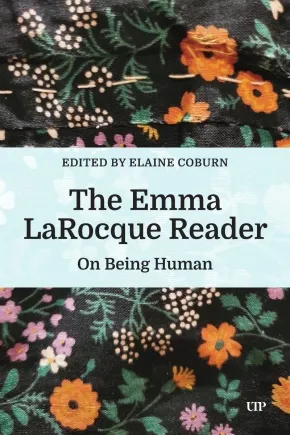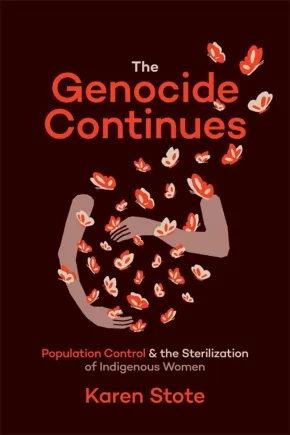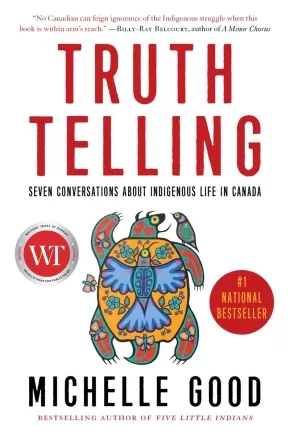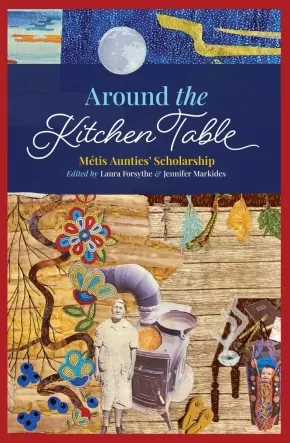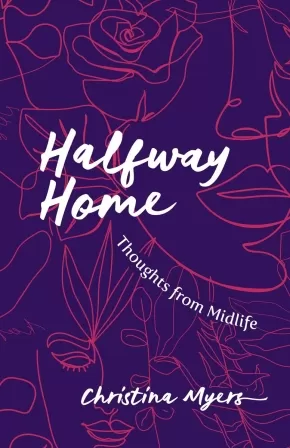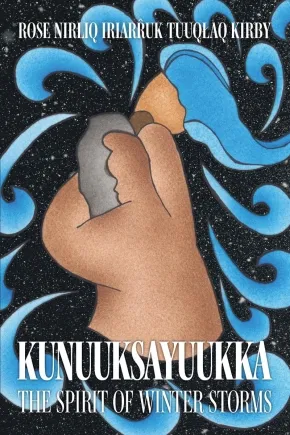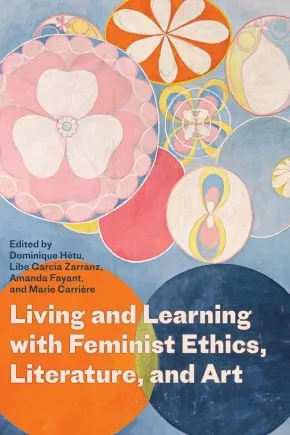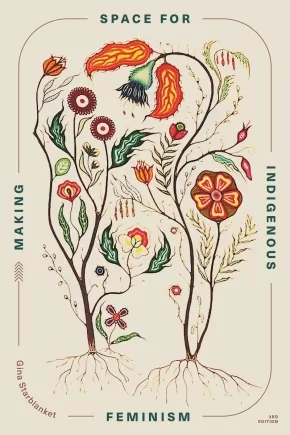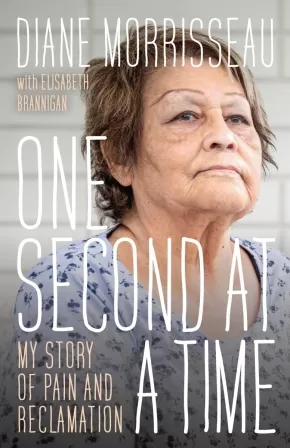
Women's Studies
16
-
30
of
131 Results;
Sort By
Go To
of 9
The Emma LaRocque Reader: On Being Human
$39.95
Editors:
Format:
Paperback
Text Content Territories:
Indigenous Canadian; Métis;
Reading Level: N/A
ISBN / Barcode: 9781487551889
Synopsis:
Synopsis:
Emma LaRocque was born in 1949 in Lac La Biche into a Cree-speaking Métis family. She grew up in a one-room, kerosene-lit log cabin built by her father. At the age of nine, she fought her parents to attend school, where she encountered English and the colonizer’s harmful stereotypes of Indigenous peoples. Confronting the contradictions of colonialism sparked her journey as a writer and scholar, as she sought to understand the dissonance between her identity and the world around her.
The Emma LaRocque Reader is a comprehensive collection of her most significant writings, poetry and prose, offering an intimate window into the mind of one of Canada’s foremost Indigenous scholars. Through her work, LaRocque provides profound insights into the intersections of colonialism, sexism, and racism in Canada, while also critically celebrating the beauty of her community and culture. In the afterword, she reflects on fifty years of challenging the colonial enterprise. A vital contribution to postcolonial literature, The Emma LaRocque Reader intertwines the personal and the political to explore what it means to be human, offering a powerful testament to Indigenous resistance, resilience, and vision.
This collection brings together the works of Métis scholar Emma LaRocque, offering a half-century of her poetry and prose, and shedding new light on Canada, colonialism, and Indigenous resistance.
Educator Information
Chapters
Foreword by Armand Ruffo
Preface by Elaine Coburn
Acknowledgments by Emma LaRocque
Acknowledgments of Permissions to Reprint
Introduction by Elaine Coburn
1975 A Personal Essay on Poverty (Excerpt from Defeathering the Indian)
1983 The Métis in English Canadian Literature
1988 On the Ethics of Publishing Historical Documents
1989 Racism Runs through Canadian Society
1990 Preface: Here Are Our Voices: Who Will Hear?
1990 Geese (poem)
1990 Nostalgia (poem)
1990 “Progress” (poem)
1990 The Red in Winter (poem)
1990 Incongruence (poem)
1990 Loneliness (poem)
1990 Beggar (poem)
1990 Tides, Towns, and Trains
1992 My Hometown, Northern Canada, South Africa (poem)
1993 Violence in Aboriginal Communities
1994 Long Way from Home (poem)
1996 The Colonization of a Native Woman Scholar
1996 When the Other Is Me: Native Writers Confronting Canadian Literature
2001 Native Identity and the Métis: Otehpayimsuak Peoples
2001 From the Land to the Classroom
2004 When the Wild West Is Me
2006 Sweeping (poem)
2006 Sources of Inspiration: The Birth of "For the Love of Words": Aboriginal Writers of Canada
2007 Métis and Feminist
2009 Reflections on Cultural Continuity through Aboriginal Women’s Writings
2010 Native Writers Reconstruct: Pushing Paradigms
2013 For the Love of Place – Not Just Any Place: Selected Métis Writings
2015 “Resist No Longer”: Reflections on Resistance Writing and Teaching
2016 Contemporary Métis Literature: Resistance, Roots, Innovation
2016 Colonialism Lived
2017 Powerlines (poem)
2022 Wehsakehcha, Comics, Shakespeare, and the Dictionary
2023 Afterword
Index
Additional Information
348 pages | 6.00" x 9.00" | Paperback
The Genocide Continues: Population Control and the Sterilization of Indigenous Women
$36.00
Format:
Paperback
Text Content Territories:
Indigenous Canadian;
Reading Level: N/A
ISBN / Barcode: 9781773637693
Synopsis:
Synopsis:
Indigenous Peoples in Canada have experienced coerced sterilization under eugenics legislation since the 1930s, and the violence has never stopped, even though eugenics fell into disrepute. In The Genocide Continues, Karen Stote traces the historical, political, economic and policy context informing the coerced sterilization of Indigenous women from 1970 onward. She shows how a powerful idea paved the way for the expanded violations of Indigenous People’s bodies and futures. That idea was population control — a concern with who occupied land and how resources were distributed — and it was a central thread guiding public health interventions from eugenics to family planning.
The Genocide Continues offers new insights to show how federal, provincial and corporate activities intersected to criminalize and regulate Indigenous reproduction. Saskatchewan, which first established family planning policies in the 1970s and is now the province with the highest number of Indigenous women coming forward with experiences of coerced sterilization, is Stote’s case study to demonstrate why family planning activities consistently targeted Indigenous women.
Stote weaves compelling archival evidence with principled storytelling to connect violence against Indigenous bodies to violence against Indigenous lands. Unless and until colonialism, extractivism and dispossession are addressed, a genocide against Indigenous peoples will continue.
Reviews
"Karen Stote has skillfully woven archival documents with evidence in policy, philanthropy, and medicine to show the repulsive side of Canada’s health care system as an assimilation tool. This book recounts the reasons why forced and coercive sterilization of Indigenous Peoples happened and is still happening." - Karen Lawford, Queen's University
Additional Information
288 pages | 6" x 9" | Paperback
FLASH SALE! Truth Telling: Seven Conversations about Indigenous Life in Canada (PB)
$15.75 $21.00
Format:
Paperback
Text Content Territories:
Indigenous Canadian;
Reading Level: N/A
ISBN / Barcode: 9781443467841
Synopsis:
Synopsis:
A bold, provocative collection of essays exploring the historical and contemporary Indigenous experience in Canada.
With authority and insight, Truth Telling examines a wide range of Indigenous issues framed by Michelle Good’s personal experience and knowledge.
From racism, broken treaties, and cultural pillaging, to the value of Indigenous lives and the importance of Indigenous literature, this collection reveals facts about Indigenous life in Canada that are both devastating and enlightening. Truth Telling also demonstrates the myths underlying Canadian history and the human cost of colonialism, showing how it continues to underpin modern social institutions in Canada.
Passionate and uncompromising, Michelle Good affirms that meaningful and substantive reconciliation hinges on recognition of Indigenous self-determination, the return of lands, and a just redistribution of the wealth that has been taken from those lands without regard for Indigenous peoples.
Truth Telling is essential reading for those looking to acknowledge the past and understand the way forward.
Reviews
“With blistering clarity, Michelle Good exposes the contradictions at the heart of Canada, but also imagines beyond them, setting out a specific vision for an Indigenous future governed by us. Good’s essays, woven with personal testimony, are deeply researched and traverse great swaths of history and policy; they are also very rousing and moving. No Canadian can feign ignorance of the Indigenous struggle when this book is within arm’s reach.” — Billy-Ray Belcourt, author of A Minor Chorus
"Good reminds us what the truth in Truth and Reconciliation actually requires of all of us: Indigenous peoples and Canadians. Addressing storytelling and historical myth-making, this book would have changed my nineteen-year-old world had it been available and rendered normative for my teachers. Good’s work is formidable, elemental and reminiscent of Cardinal’s Unjust Society. This work, should be required reading for every Canadian. Smart, generous and insightful. 'There is no such thing as Crown Land. It is all Indigenous land.' Good writes. This truth resonates. Serves notice: it is time." — Dr. Tracey Lindberg, Law Professor, author of Birdie
“Truth Telling is at once heartfelt, instructive, and authentic, expertly exploring the key issues that have shaped the Indigenous reality in Canada.… This collection is an indispensable resource.” — Waubgeshig Rice, author of Moon of the Crusted Snow
“As Canadians search for a national approach to reconciliation... this book reminds us of how we arrived at this moment.…[and] is the kind of reference that will help us navigate our fraught journey.” — Dr. Eldon Yellowhorn, Professor of Indigenous Studies, Simon Fraser University
“Truth Telling is a powerful, urgent, and necessary book that gets to the heart of true reconciliation and maps a course for achieving it. Bridging personal stories and lived experiences with sharp historical analysis, Michelle Good’s writing is both beautiful and heartbreaking. Honest, forthright, and powerful, Truth Telling offers insights and analysis that every policymaker and politician—indeed, any person who calls Canada “home”— can and must read. Urgently.” — 2023 Balsillie Prize for Public Policy Jury
Educator Information
Truth Telling is a collection of essays about the contemporary Indigenous experience in Canada.
Additional Information
232 pages | 5.00" x 7.50" | Paperback
Apocalypse Child: Surviving Doomsday and the Search for Identity at the End of the World
$24.95
Format:
Paperback
Text Content Territories:
Indigenous Central American; Indigenous Peoples in Mexico; Yaqui (Yoeme);
ISBN / Barcode: 9781773861326
Synopsis:
Synopsis:
Carly Butler was a lively, imaginative child being raised by her strong and independent mom, DJ, in 1990s Montana. They were a dynamic duo, working on housing projects and bringing music to the local church. Then, a whisper of a threatened future began to grow louder: Y2K was coming.
Believing every conspiracy theory and Evangelical Christian prediction they encountered to be true, DJ and a young, impressionable Carly set out on a lonely path. Taught to prepare for the worst and to fear her girlhood dreams as warnings from God, Carly and her mother flee to the Canadian wilderness, leaving behind Barbies and Nintendo for chopping wood and shooting empty bottles for target practice. They connected with other Evangelical Christians preparing for doomsday, but were often stranded alone, without electricity, for weeks at a time as the winter—and the apocalypse—approached.
But what happens when the world doesn’t end, after all?
Apocalypse Child is a startling memoir about growing up in a tumultuous home, coming of age in isolation, and trying to figure out how to connect as an adult when your education has consisted of conspiracy theories, survivalist measures, and religious doctrine. From doomsday preparation and ideologies of purity and paranoia to motherhood and explorations of a burgeoning queer, Mexican-Indigenous identity, Carly Butler takes us on a gripping journey of resilience, self-discovery, and searching for community.
Additional Information
246 pages | 6.00" x 9.00" | Paperback
Around the Kitchen Table: Métis Aunties' Scholarship
$27.95
Editors:
Format:
Paperback
Text Content Territories:
Indigenous Canadian; Métis;
Reading Level: N/A
ISBN / Barcode: 9781772840735
Synopsis:
Synopsis:
Honouring the scholarship of Métis matriarchs
While surveying the field of Indigenous studies, Laura Forsythe and Jennifer Markides recognized a critical need for not only a Métis-focused volume, but one focused on the contributions of Métis women. To address this need, they brought together work by new and established scholars, artists, storytellers, and community leaders that reflects the diversity of research created by Métis women as it is lived, considered, conceptualized, and re-imagined.
With writing by Emma LaRocque and other pioneers of Métis studies, Around the Kitchen Table looks beyond the patriarchy to document and celebrate the scholarship of Métis women. Focusing on experiences in post-secondary environments, this collection necessarily traverses a range of methodologies. Spanning disciplines of social work, education, history, health care, urban studies, sociology, archaeology, and governance, contributors bring their own stories to explorations of spirituality, material culture, colonialism, land-based education, sexuality, language, and representation. The result is an expansive, heartfelt, and accessible "community of Métis thought," as articulated by Markides.
Reverent and revelatory, this collection centres the strong aunties and grandmothers who have shaped Métis communities, culture, and identities with teachings shared in classrooms, auditoriums, and around the kitchen table.
Reviews
"Inspiring, healing, and future-facing, this long overdue book gives us valuable new insights into the histories and identities of Métis people." — Kim Anderson
"Around the Kitchen Table is an exciting and thought-provoking contribution to the fields of Métis Studies and Indigenous feminism. Reading this book is like sitting down to visit with a strong cup of tea and your favourite aunties. It will inspire readers to think about matriarchy in new and exciting ways, teaching us what it means to be Métis women, good relatives, and innovative scholars." — Cheryl Troupe
Educator Information
Other contributors: Jennifer Adese, Christi Belcourt, Hannah Bouvier, Rita Bouvier, Vicki Bouvier, Robline Davey, Leah Marie Dorion, Marilyn Dumont, Nicki Ferland, Chantal Fiola, Lucy Fowler, Chelsea Gabel, Janice Cindy Gaudet, Emily Haines, Shalene Jobin, Emma LaRocque, Amanda LaVallee, Lynn Lavallee, Avery Letendre, Kirsten Lindquist, Yvonne Poitras Pratt, Angela Rancourt, Lisa Shepherd, Allyson Stevenson, Kisha Supernant, Caroline Tait, Angie Tucker, Dawn Wambold
Table of Contents
Contributors
Foreword by Caroline Tait
The Work of Métis Women: An Introduction – Jennifer Markides
Part One: Identity
1. Brown Names – Marilyn Dumont
2. We Know Ourselves – Lisa Shepherd
3. Kaa-waakohtoochik: The Ones Who Are Related to Each Other – Vicki Bouvier
4. The Roots Always Remain: Reconnecting to Our Communities in the Twenty-First Century – Angie Tucker
5. For the Love of Place―Not Just Any Place: Selected Metis Writings – Emma Larocque
6. Coming Home through Métis Research – Allyson Stevenson
7. Valuing Métis Identity in the Prairies through a “5 R” Lens: Our Digital Storytelling Journey – Chelsea Gabel and Amanda LaVallee
8. Prenatal/Postpartum Ceremonies and Parenting as Michif Self-Determination – Chantal Fiola
9. Medicine Women – Jennifer Adese
10. Lii Michif – Lisa Shepherd
Part Two: Women in the Academy
11. Metis Women as Contributors to the Academy Despite Colonial Patriarchy – Laura Forsythe
12. Connecting to Our Ancestors Through Archaeology: Stories of Three Métis Women Academics – Kisha Supernant, Dawn Wambold, and Emily Haines
13. Métis Women Educating in the Academy – Yvonne Poitras Pratt and Jennifer Markides
14. Structural and Lateral Violence Toward Metis Women in the Academy – Lynn Lavallee
Part Three: Research Methodology
15. Métis Research and Relationality: Auntie Governance, the Visiting Way, and Kitchen Table Reflections – Kirsten Lindquist, Shalene Jobin, Avery Letendre
16. Lii Taab di Faam Michif/Metis Women’s Kitchen Table: Practicing Our Sovereignty – Cindy Gaudet and Angela Rancourt
17. Wahkotowin: An Approach to Indigenous (Land-Based) Education – Nicki Ferland
18. Kaa-natoonamaan taanshi chi-ishi-natoonikeeyaan: My Search for how to Research Things (in a Queer Métis paradigm) – Lucy Fowler
19. Differentiating Métis Feminism – Robline Davey
20. Celebrating the Wisdom of Our Métis Matriarchs: Sewing Our Wellness All Together—Kood Toot Aansamb – Leah Dorion, Janice Cindy Gaudet, Hannah Bouvier
21. if the land could speak – Rita Bouvier
Bibliography
Art – Christi Belcourt
Additional Information
200 pages | 6.00" x 9.00" | index, bibliography | Paperback
Becoming a Matriarch (PB)
$23.00
Format:
Paperback
Text Content Territories:
Indigenous Canadian; First Nations; Dene; Dane-zaa (Dunne-za);
Reading Level: N/A
ISBN / Barcode: 9780385697798
Synopsis:
Synopsis:
When matriarchs begin to disappear, there is a choice to either step into the places they left behind, or to craft a new space.
Helen Knott’s bestselling debut memoir, In My Own Moccasins, wowed reviewers, award juries, and readers alike with its profoundly honest and moving account of addiction, intergenerational trauma, resilience, and survival. Now, with her highly anticipated second book, Knott exceeds the highest of expectations with a chronicle of grief, love, and legacy. Having lost both her mom and grandmother in just over six months, forced to navigate the fine lines between matriarchy, martyrdom, and codependency, Knott realizes she must let go, not just of them, but of who she thought she was.
Woven into the pages are themes of mourning, sobriety through loss, and generational dreaming. Becoming a Matriarch is charted with poetic insights, sass, humour, and heart, taking the reader over the rivers and mountains of Dane Zaa territory in Northeastern British Columbia, along the cobbled streets of Antigua, Guatemala, and straight to the heart of what matriarchy truly means. This is a journey through pain, on the way to becoming.
Through writing, reflecting, and dreaming I found my way to the real lessons.
I found permission to become whoever I needed to be.
I found permission to live a life and not just endure it.
I found permission to belong deeply to myself.
I found permission to lay to rest the sorrow of the women before me and to cultivate joy for us in its place.
Awards
- 2024 BC Book Awards - The George Ryga Award for Social Awareness in Literature winner
Reviews
“In enchantingly vivid language and with a compelling narrative arc, Helen Knott’s new masterpiece is a memoir of grief and joy, loss and rediscovery, flight and return and, above all, a paean to the beautiful, eternal, soothing and all-encompassing power of matriarchy.” —Gabor Maté MD, author of The Myth of Normal: Trauma, Illness and Healing in a Toxic Culture
“Knott lays out that which all Indigenous women know and feel on a cellular level—we are only here because of the women, the matriarchs, the warriors, the survivors, the courageous ones, the fierce ones, the loving ones who came before us. Beautifully, tenderly Knott maps out for the reader the intrinsic way Indigenous women lift up, celebrate and support one another. Even when no one else does. We always have each other. We see each other. We are each other’s medicine. And there is no greater gift. These are the stories Indigenous women must tell—the journeys, reclamation and place of matriarchs. Present in Knott’s words are paths to reconciliation for everyone.” —Nahanni Fontaine, Member of the Legislative Assembly of Manitoba
“Becoming a Matriarch is a vivid, lyrical exploration of womanhood, loss, grief, and eventually, self-love, braided together with radiance and wisdom. Knott brilliantly uses memory as a tool for self-exploration and growth. The land, dreams and body are in constant communication: ‘My body knows the mountains and rivers and berry bushes that it comes from.’ Throughout the book you can’t help but ask yourself, what does it mean to come from strong women and still allow yourself space to be loved? Becoming a Matriarch teaches us that joy can exist inside the cracks of the most tumultuous times in our lives and love can still bloom if we let it.” —Chelene Knight, author of Dear Current Occupant and Junie
“Becoming a Matriarch is a feast of remarkable, colourful, deep and profoundly raw storytelling. Helen Knott is one of the greatest Indigenous literary artists of our time.” —Brandi Morin, author of Our Voice of Fire: A Memoir of a Warrior Rising
Additional Information
224 pages | 5.18" x 8.00" | Paperback
Curve!: Women Carvers on the Northwest Coast
$45.00
Artists:
Format:
Hardcover
Text Content Territories:
Indigenous Canadian; First Nations;
Reading Level: N/A
ISBN / Barcode: 9781773272542
Synopsis:
Synopsis:
An eighty-year overview of wood and argillite carving by Indigenous women artists on the Northwest Coast.
Though women of the Northwest Coast have long carved poles, canoes, panels, and masks, many of these artists have not become as well known outside their communities as their male counterparts. These artists are cherished within their communities for helping to keep traditional carving practices alive, and for maintaining the dances, songs, and ceremonies that are intertwined with visual art production. This book, and an associated exhibition at the Audain Art Museum, gathers a range of sculptural formats by Indigenous women in order to expand the discourse of carving in the region.
Both the exhibition and publication are co-curated by Dana Claxton, artist, filmmaker and head of the University of British Columbia's Department of Art History, Visual Art and Theory; and Dr. Curtis Collins, the AAM's Director & Chief Curator. Commentaries by Skeena Reece, Claxton, and Marika Swan, and interviews with artists Dale Campbell and Mary Anne Barkhouse are presented alongside more than one hundred artworks from public and private collections across North America, including several newly commissioned pieces.
Featured artists include:
- Ellen Neel (Kwakwaka'wakw, 1916-1966) - Freda Diesing (Haida, 1925-2002) - Doreen Jensen (Gitxsan, 1933-2009) - Susan Point (Musqueam, b. 1952) - Dale Campbell (Tahltan, b. 1954) - Marianne Nicolson (Kwakwaka'wakw, b. 1969) - Arlene Ness (Gitxsan, b. 1970s) - Melanie Russ (Haida, b. 1977) - Marika Swan (Nuu-chah-nulth, b. 1982) - Morgan Asoyuf (Ts'msyen, b. 1984) - Cori Savard (Haida, b. 1985) - Cherish Alexander (Gitwangak, b. 1987) - Stephanie Anderson (Wetsuwet'en, b. 1991) - Veronica Waechter (Gitxsan, b. 1995)
Awards
- Winner of the 2025 Bill Duthie Booksellers' Choice Award
Additional Information
160 pages | 9.20" x 1.10" | 120 colour photos | Hardcover
Halfway Home: Thoughts from Midlife
$23.99
Format:
Paperback
Text Content Territories:
Indigenous Canadian; First Nations; Kwakwaka'wakw (Kwakiutl); Da'naxda'xw Awaetlala;
ISBN / Barcode: 9781487012441
Synopsis:
Synopsis:
Award-winning author Christina Myers navigates the uncharted territory of midlife in a time of rapid social, cultural, and environmental change.
Modern midlife is finding oneself halfway home but without any reliable maps for the route ahead. With wit and warmth, these personal essays move from a first bra to first hot flashes to consider the lessons we learn through media and culture--and from each other--about bodies, sexuality, fatphobia, gender roles, and what we should want in life. Christina Myers explores the ways that beauty standards and cultural expectations around femininity have shaped our identities and how we might shed those going forward; the power of friendships and the value of having other women to learn from; the anxiety of moving through motherhood into menopause in a time of global environmental crisis and political upheaval; and the uncertainty of how this stage of life should unfold, as old systems shift and crumble. Though our maps for midlife are never identical, we discover familiar paths and common landmarks in each other's stories; these essays remind us there are others on this trail with us, just behind or just ahead, out of sight. We are not alone.
Reviews
"Reading Halfway Home feels like having a conversation with a very wise, witty friend. Christina Myers's delightful collection of essays about the stages of a woman's life is personal, but also universal. We've all been there, and it's a joy to realize that we're not alone on the journey." — Elizabeth Renzetti, author of Shrewed: A Wry and Closely Observed Look at the Lives of Women and Girls
"Christina Myers effortlessly charts the often-overlooked territory of being a woman in today's complex society. Through insightful personal essays, she explores the intricate intersections of femininity, friendship, motherhood, and environmental turbulence, all with a nostalgic flair. With much-needed humour and wisdom, Myers reminds us that even in the midst of uncertainty, we're never alone on this journey. This book is a necessary, heartfelt guide for those seeking their own unique path through the maze of midlife. A must read!" — Chelene Knight, award-winning author of Let It Go: Free Yourself from Old Beliefs and Find a New Path to Joy
"Halfway Home is a love letter to mothers and grandmothers, sisters and daughters, witches and crones. Christina Myers's storytelling is gentle and honest, a must-read memoir for women of all ages. So many times, I found myself nodding and exclaiming, 'Yes! That's exactly it!' It's a mirror but also an invitation to join a secret coven of wise women." — K. J. Aiello, author of The Monster and the Mirror: Mental Illness, Magic, and the Stories We Tell
Educator Information
Includes one chapter focusing on the author's Indigenous identity.
Additional Information
200 pages | 5.50" x 8.50" | Paperback
Kunuuksayuukka: The Spirit of Winter Storms
$25.95
Format:
Paperback
Text Content Territories:
Indigenous Canadian; Inuit; Inuvialuit (Mackenzie Inuit);
Reading Level: N/A
ISBN / Barcode: 9780981262710
Synopsis:
Synopsis:
Kunuuksayuukka: The Spirit of Winter Storms is a story of Inuvialuk (Western Arctic Inuk) Elder Rose Kirby's early life, beginning from her vibrant traditional life on the land, to being taken away on a "ship of tears" to residential school in Aktlarvik (Aklavik), before moving around different DEW Line sites following her father Joseph Saraana Thrasher's work. Known for her powerful memory and storytelling skills, Rose vividly recounts stories from her childhood and even infancy.
Kunuuksayuukka: The Spirit of Winter Storms honours the important lessons that Rose has learned from her Elders and family, through watching how they interacted with one another, as well as with the larger natural world. Rose uses Kunuuksayuukka-the spirit of winter storms-and its slow disappearance from her life, to describe her own transition from traditional, nomadic life on the land to moving into housing settlements created by tan'ngit (white people).
Through almost 300 pages, Rose's book weaves through candid stories of human relationships, loss, love and care for one another, humour, pain, strength, and resilience. Most importantly, it is a heartfelt tribute to Inuvialuit culture, language, history, life, and experiences-all through the eyes of an Inuvialuk who has learned to move with the changing world as she grew up. This book is a must-read for anyone who wants to learn about how Inuvialuit lived long ago.
Additional Information
6.00" x 9.00" | 25 b&w photographs | Paperback
Living and Learning with Feminist Ethics, Literature, and Art
$39.99
Editors:
Format:
Paperback
Text Content Territories:
Indigenous Canadian;
Reading Level: N/A
ISBN / Barcode: 9781772127713
Synopsis:
Synopsis:
This transdisciplinary collection investigates relations of “living and learning with” as compelling forms of engagement and care between humans, nonhumans, and more-than-humans. Through academic and creative writings, contributors address the need for sustainable relationships between various feminist positions, focussing on Indigenous and Black knowledges, queer and trans artistic interventions, and anti-racist methodologies. They pursue crucial conversations on intersecting oppressions, intersubjectivities, voices, and positionalities. Rooted in feminist literary and artistic practices, the volume explores urgent ongoing transnational issues and will benefit scholars in literature, Indigenous studies, intercultural studies, and gender studies.
Contributors: Kim Anderson, Alexandre Baril, Sissel M. Bergh, Marie Carrière, Élise Couture-Grondin, Junie Désil, Amanda Fayant, Mylène Yannick Gamache, Libe García Zarranz, Dominique Hétu, Larissa Lai, Amina Lalor, Sheri Longboat, Brittany Luby, Stephanie Oliver, Anne Quéma, Veronika Schuchter, Erin Soros, Erin Wunker
Reviews
"This groundbreaking collection redefines feminist poetics, offering timely provocations and sophisticated insights. Engaging with critical university studies, Indigenous studies, trans studies, disability studies, and more, it explores ethical encounters and practices of care and reciprocity not just among humans, but beyond the human as well. The diverse yet thematically cohesive contributions highlight poetry’s role in addressing urgent cultural and political issues." - Sarah Dowling, University of Toronto
"Rarely has such an assortment of talented theorists and literary critics been collected to discuss feminist ethics. With essays arising from vigorous scholarly and artistic practices, the work will engage feminists, literary scholars, poets, activists, and scholars of gender and critical race theory." -Deanna Reder, Simon Fraser University
Additional Information
294 pages | 6.00" x 9.00" | Paperback
Making Space for Indigenous Feminism - 3rd Edition
$40.00
Format:
Paperback
Text Content Territories:
Indigenous Canadian;
Grade Levels: 12; University/College;
ISBN / Barcode: 9781773635507
Synopsis:
Synopsis:
The third edition of this iconic collection features Indigenous feminist voices from across generations and locations, including many exciting new contributors.
The third edition of the iconic collection Making Space for Indigenous Feminism features feminist, queer and two-spirit voices from across generations and locations.
Feminism has much to offer Indigenous women, and all Indigenous Peoples, in their struggles against oppression. Indigenous feminists in the first edition fought for feminism to be considered a valid and essential intellectual and activist position. The second edition animated Indigenous feminisms through real-world applications. This third edition, curated by award-wining scholar Gina Starblanket, reflects and celebrates Indigenous feminism’s intergenerational longevity through the changing landscape of anti-colonial struggle and theory. Diverse contributors examine Indigenous feminism’s ongoing relevance to contemporary contexts and debates, including queer and two-spirit approaches to decolonization, gendered and sexualized violence, storytelling and narrative, digital and land-based presence, Black and Indigenous relationalities and more. This book bridges generations of powerful Indigenous feminist thinking to demonstrate the movement’s cruciality for today.
Reviews
“This collection is all feast, no fluff. It covers foundational elements of Indigenous feminism with depth and breadth and engages issues of national and international importance with considerable insight. Due to its readability and smart use of theory, this book is eminently teachable. I haven't highlighted this much in a long time.”— Margaret Robinson, Canada Research Chair in Reconciliation, Gender, and Identity
“This volume offers a view of the development and expansion of Indigenous feminisms as theory and praxis, reaffirming the validity of our respective Indigenous epistemologies to guide us into the future.”— Jennifer Nez Denetdale (Diné), University of New Mexico
“Multiplying are the calls for transformative healing issued by Indigenous feminism which is, at its core, about Indigenous sovereignty, solidarity, and liberatory justice for all. The diverse and incisive essays in Making Space for Indigenous Feminism (3rd ed) expose ongoing cis-heteropatriarchal settler colonialism, anti-Indigenous racism, and the erasure of gender and sexual diversity (including by Indigenous people ourselves), and their impacts upon minds, bodies, lived experiences, and relationships. Resistance and hope abound in the re-centring of (queer) Indigenous feminist futurisms: world-building that honours the self-determination of Indigenous women, girls, Two-Spirit, and trans folks, and promotes wellbeing for all of Creation.”— Chantal Fiola, author and associate professor, University of Manitoba
“This third edition continues to fulfill the promise of the title to make space for feminist interventions in Canadian Indigenous studies. Each author is committed to relational ethics and transformative praxis in addressing the most pressing issues that create epistemic and material injustices. From the heart rendering an intimate state-of-the-field assessment from pillars in the field, the politics of gender, policy, and violence manifested in Canada currently, to its latter chapters that open up new spaces by continuing to press for just Indigenous futures, of which decentering binaries of gender and sexuality is necessary, we see the importance of Indigenous feminist theorizing and praxis. Confronting gendered violence, heterosexism, disciplinary regimes, and colonialism with honesty and truth telling, Making Space generously offers us new paths to materialize a decolonial world.”— Mishuana Goeman, author of Mark My Words and Settler Aesthetics: Visualizing the Spectacle of Originary Moments in The New World
“Making Space for Indigenous Feminism provides us with powerful voices emerging from and incorporating past, present, and future. Each chapter continues to make space for the power of Indigenous feminisms, as women, femme, Queer, LGBTQS+ and Mad think together in a powerful analysis of our now. This latest edition of a classic, newly edited by Gina Starblanket, includes Elders and youth and brings us back to why Indigenous feminisms are the embodied, lived and felt knowledges that will inform our struggles going forward.”— Dian Million, University of Washington, American IndianStudies
Educator Information
Table of Contents
Extending Our Accounts of Indigenous Feminism—Joyce Green and Gina Starblanket
Section I: Home | Identity | Legacies
- Always Coming Home: Indigenous Identity, Indigenous Feminism, Scholarship and Life—Joyce Green
- Why Am I a Feminist?—Emma LaRocque
- Settler Colonialism in Canada: Making “Indian” Women Disappear—Mary Eberts, Shelagh Day, Sharon McIvor
Section II: Institutions | Representation | Resistance
- Red Ticket Women: Revisiting the Political Contributions of the Indian Rights for Indian Women’s Movement—Gina Starblanket
- Perpetual State of Violence: An Indigenous Feminist Anti-Oppression Inquiry into Missing and Murdered Indigenous Women and Girls—Robyn Bourgeois
- Gender Reveals that Matter: Cis-Heteropatriarchy, Settler Colonialism, and Child Welfare—Megan Scribe
Section III: Land | Relationality | Love
- Towards an Anti-Colonial Feminist Care Ethic—Eva Jewell
- Our Movements Need some Love as Well: Indigenous Land Defense and Relationality—Isabel Altamirano-Jimenez
- Mana Wahine and Mothering at the Loʻi: A Two-Spirit/Queer Analysis—Hōkūlani K. Aikau
Section IV: Decoloniality | Movement | Futurities
- Decolonization is a Queer Desire: Poetics, Politics, Negativity—Billy-Ray Belcourt
- Mad Indigenous Womanhood and the Psycho-Politics of Settler Colonialism—Cara Peacock
- On Black and Indigenous Relationality: A Conversation—Gina Starblanket, Robyn Maynard, Leanne Betasamosake Simpson
- Decolonization is Also Metaphorical: Indigenous Feminist and Queer-Two-Spirit Storywork Matters—Kelly Aguirre
Additional Information
320 pages | 6.00" x 9.00" | Paperback
Métis Matriarchs: Agents of Transition
$34.95
Editors:
Format:
Paperback
Text Content Territories:
Indigenous Canadian; Métis;
Reading Level: N/A
ISBN / Barcode: 9781779400116
Synopsis:
Synopsis:
Explores the integral roles that Métis women assumed to ensure the survival of their communities during the fur trade era and onward
Métis Matriarchs examines the roles of prominent Métis women from across Western Canada from the late 19th to the mid-20th century, providing a rare glimpse into the everyday lives of these remarkable women who were recognized as Matriarchs and respected for their knowledge, expertise, and authority within their families and communities.
This edited collection provides an opportunity to learn about the significant contributions made by Métis women during a transitional period in Western Canadian history as the fur trade gave way to a more sedentary, industrialized, and agrarian economy. Challenging how we think about Western Canadian settlement processes that removed Indigenous peoples from the land, this collection of stories examines the ways Métis matriarchs responded to colonial and settler colonial interventions into their lives and livelihoods and ultimately ensured the cultural survival of their communities.
Awards
- 2025 Canadian Historical Association Indigenous History Book Prize
Reviews
“A nuanced account of the lives of Métis women and their vital roles as they helped guide their families and communities through generations of transitions.” —Michel Hogue, author of Metis and the Medicine Line
Additional Information
336 pages | 5.00" x 8.00"| Paperback
One Second at a Time: My Story of Pain and Reclamation
$24.95
Format:
Paperback
Text Content Territories:
Indigenous Canadian; First Nations; Anishinaabeg; Sagkeeng;
Reading Level: N/A
ISBN / Barcode: 9780774880978
Synopsis:
Synopsis:
Bullied and abused at the Fort Alexander Indian Residential day school, Diane Morrisseau fought back and left school at the age of fifteen. Despite her strength, a childhood of trauma and abuse led her into the arms of Edgar Olson, and by sixteen, the young Ojibway-Anishinabe woman had given birth to her first child and married the man who would become her tormentor for the next eighteen years.
For almost two decades, Diane Morrisseau was chained to a brutal husband who abused not only her, but their children. By threatening Diane with their death and hers should she ever try to leave, he ensured that she would continue to endure his cruelty. Notoriously violent, her abuser was aided and abetted by the systems of colonialism that failed to protect Diane during her childhood. Edgar was able to keep Diane and her children trapped in a cycle of violence for years, without being held accountable by law or society.
Despite this, Diane found the strength to walk away. This book is the story of how she did so, and how she rebuilt a life beyond her abuser. Through Al-Anon, Anishinabe traditional healing ceremonies, counselling, and care for others, Diane found a new path illuminated by compassion and purpose.
Diane Morrisseau recounts her traumatic history with one aim: to help other victims of violence know they are not alone, and that escape is possible. The author’s entire career, and this book, testify to her desire to extend to others the hope that eluded her in the depths of her desperate circumstances.
Devastatingly frank about the abuse she suffered, the mothering her children missed because of it, and the systems that allowed it all to happen, Diane today has reconciled the past with a present where she continues to live out the values that matter to her most.
All royalties from sales of this book will be donated to Archway Community Services.
The story of an Ojibway-Anishinabe woman who, against incredible odds, rescued herself and her children from a life of brutal beatings, sexual servitude, and almost unimaginable hardship.
Reviews
"Selected as one of the most anticipated feminist books of 2024."— Ms. Magazine
"A courageous and harrowing story. Morrisseau uses her painful personal journey to frame the horrific history of residential schools. Evocative and illuminating."
— Angela Sterritt, author of Unbroken: My Fight for Survival, Hope, and Justice for Indigenous Women and Girls
"I is, in many ways, a difficult story to read – but it is one that needs to be told. Readers will learn about a courageous woman and the circumstances that enabled an abusive relationship, and hear her message for how to recognize the situation and take steps toward a better life."— Don McCaskill, co-author of In the Words of the Elders
"A fervent call to action, an impassioned plea for compassion and empathy, and a formidable rallying cry that seeks to instigate transformation [… One Second at a Time] serves as a bridge, seeking to connect human souls through shared understanding and collective responsibility."— From the foreword by Marlyn Bennett
"Raw and brutally honest. Morrisseau bravely shares the details of her life with a violent man. Validating and inspiring, her story affirms the complicated healing journey of abuse survivors. It’s a must read for anyone working in the field of gender-based violence."— Kendra Nixon, director of Research and Education for Solutions to Violence and Abuse (RESOLVE)
"Diane Morrisseau has taken us into her confidence with her story, allowing us to truly understand as a society how the relationship between Indigenous people and settlers has created immense hardships for Indigenous people, families, and communities."— Marion Maar, professor, Northern Ontario School of Medicine University
Educator Information
All royalties from sales of this book will be donated to Archway Community Services.
Table of Contents
Foreword: A Tapestry of Truths / Marlyn Bennett
Preface
Prologue
A Note on the Text
1 A Perfect Home
2 Day School
3 Posting of the Bands
4 Mrs. Olson
5 Holes in the Walls
6 Breakdown
7 Scars
8 Breaking Free
9 Seeing the Trees
10 Freedom at Last
Acknowledgments
About the Authors
Additional Information
198 pages | 5.50" x 8.50" | Paperback
Swiftly Flowing Waters: A Metis Woman's Story of Resilience, Reflection and Reclamation
$22.95
Format:
Paperback
Text Content Territories:
Indigenous Canadian | Métis|
Reading Level: N/A
ISBN / Barcode: 9781738898299
Synopsis:
Synopsis:
Pat spent a lifetime catching up to who she wanted to be. Growing up in a Métis family, it would take her decades to shed the prejudice and shame of who she was, to find her indigeneity. After escaping an alcoholic relationship, she achieved corporate success in a man’s world, switched gears to become an author of children’s books, survived breast cancer, and accepted her husband's wish to participate in MAID. These challenges are all part of Pat’s inspiring story.
Swiftly Flowing Waters is a raw reflection of the many experiences women quietly go through in life. It’s a story about finding courage, overcoming obstacles, and the discovery of joy and fulfilment along the way.
Reviews
"No one could tell this compelling story with such precision if they had not lived it. Pat's journey, as she chronicles it from four to seventy years of age, deserves to be shared - for her Metis legacy, for her ancestors who could not speak, and for her descendants who need to know the unique truth of their origins. This memoir provides an anchor of truth that is honest and unashamed. We need more courageous authors like Pat Lamondin Skene." - Fern Perkins, Registered Citizen of Metis Nation Greater Victoria and Metis Nation BC; Educator, University of Victoria and Greater Victoria School District (retired)
Additional Information
216 pages | 7.25" x 10.25" | Paperback
The Old Moon in Her Arms: Women I Have Known and Been
$24.95
Text Content Territories:
Indigenous Canadian; First Nations; Cree (Nehiyawak); Métis;
Reading Level: N/A
ISBN / Barcode: 9781774712696
Synopsis:
Synopsis:
A powerful, lyrical collection of essays from the award-winning author of Following the River, exploring the pivotal moments in her life, and how art and nature have shaped her.
Like both memory and the moon, what's written here aims to shed what light it can, bringing it home to now.
How does a woman compose a life? The Old Moon in Her Arms is a hybrid book of fragments, pivotal moments and images in the phases of a woman's life, turning points rendered in Lorri Neilsen Glenn's lyrical prose.
Like the shifting images in a kaleidoscope, these glimpses into the life of an ordinary woman lay bare the ways family, landscape, loss, and a lifelong pursuit of knowledge have forced the author in her later years to examine what really matters. Here, readers bear witness to the making of a daughter, a student, a wife, a friend, a teacher, a mother, a feminist, an award-winning scholar and writer. Neilsen Glenn's artistry weaves personal history, philosophy, pop culture, and contemporary thought to examine moments and people who've inhabited her life. "Over time and circumstance," she says, "haven't we all been various?"
Guiding her exploration are the Cree concept of wahkohtowin, the kinship in all of creation, and the elliptical path of the moon.
This hybrid collection of singular moments celebrates connection, wonder and endless curiosity.
Educator Information
Subjects/Themes: Memoir, Creativity, Aging, Literacy Collection, Prose, Poetry
Additional Information
272 pages | 6.00" x 8.00"| Paperback
Sort By
Go To
of 9

